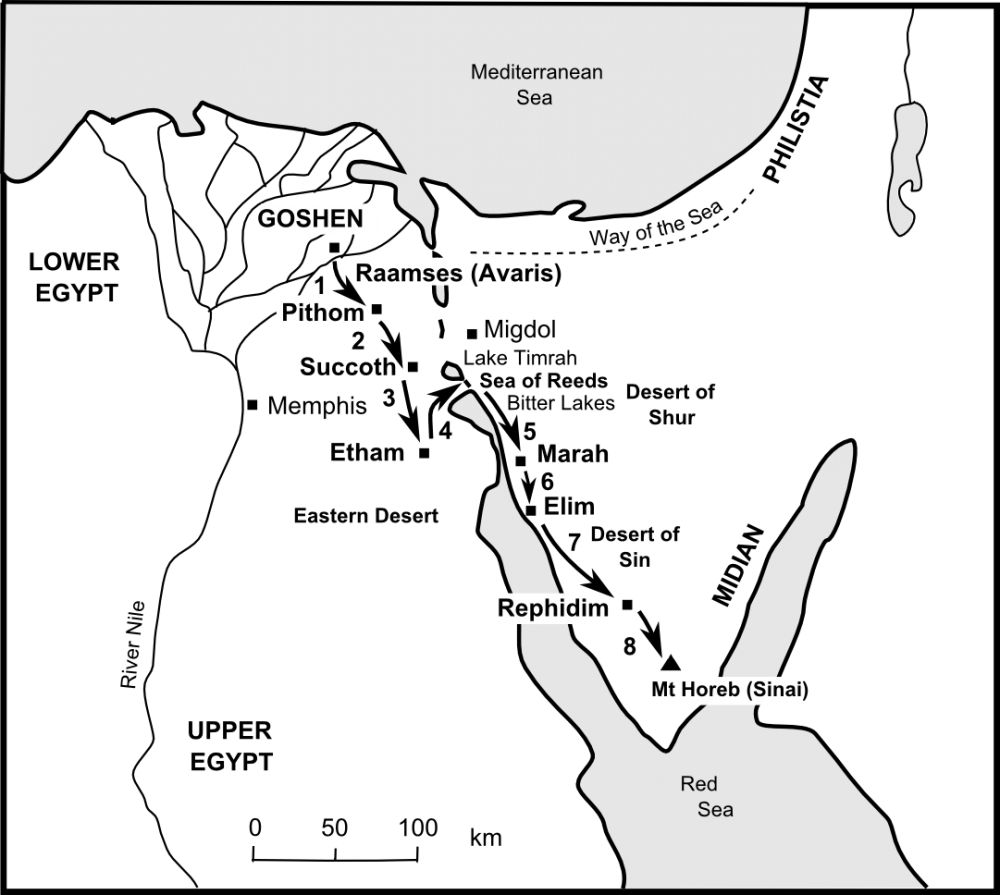14 Mar. The Israelites flee from Egypt
“At midnight the LORD killed all the firstborn sons in the land of Egypt… so there was a loud outcry everywhere in Egypt.”
“During the night the king called for Moses and Aaron and said, ‘Get up and leave my people. You and your people may do as you have asked; go and worship the LORD. Take all of your flocks and herds as you have asked, and go. And also bless me.’”
“The Egyptians also asked the Israelites to hurry and leave, saying, ‘If you don’t leave, we will all die!’”
“So the people took their dough before the yeast was added. They wrapped the bowls for making dough in clothing and carried them on their shoulders.”
“The Israelites did what Moses told them to do and asked their Egyptian neighbours for things made of silver and gold and for clothing. The LORD caused the Egyptians to think well of them, and the Egyptians gave the people everything they asked for. So the Israelites took rich gifts with them.”
“The Israelites travelled from Rameses to Succoth. There were about 600,000 men walking, not including the women and children. Many other people who were not Israelites went with them, as well as a large number of sheep, goats and cattle.”
“The Israelites used the dough they had brought out of Egypt to bake loaves of bread without yeast. The dough had no yeast in it, because they had been rushed out of Egypt and had no time to get food ready for their trip.”
“The people of Israel had lived in Egypt for 430 years; on the very day the 430 years ended, the LORD’s divisions of people left Egypt.”
(Exodus 12:29-40)

At midnight on the first Passover, the LORD struck down all the Egyptian firstborn sons.
Evidence for this disaster which fell upon the Egyptians was found during archaeological excavations at Avaris (Raamses), which revealed a mass of rapidly dug shallow graves, dating from the reign of Pharaoh Dudimose (c.1450-1446BC).
Closer examination of the burial pits showed that the bodies were thrown in on top of each other – indicating a hasty burial at a time of great disaster. Further excavations showed that the settlement at Avaris (Raamses) was abandoned shortly afterwards.
In response to this disaster, the Pharaoh summoned Moses and Aaron during the night and commanded them to take the Israelites – and their disastrous curses – away from Egypt.
So the Israelites set out from Avaris (Raamses) with their cattle, sheep and goats - and their unleavened bread - on the 14th day of the Jewish month of Nisan in c.1447BC. As it was halfway through the lunar month, the night sky was lit by a brilliant full moon, so they could see their way easily.
The Israelites set out towards Succoth (the ancient Egyptian town of Tjeku in the Wadi Tumilat). Succoth (the Hebrew word for a ‘shelter’) was located to the south of Avaris (Raamses) near Pithom (on the site of Tell al-Maskutah). The Israelites probably came this way to meet up with other fellow Hebrews escaping from Pithom (see 1 and 2 on the map).
The Israelites had lived in Egypt and Canaan for 430 years – half of this time in Egypt (see Exodus 12:40, where footnotes usually indicate the inclusion of the words “and Canaan” in the earliest manuscripts of the Bible).
The Jewish historian Josephus explained that the Israelites left Egypt 430 years after Abraham travelled to Canaan, and 215 years after Joseph invited Jacob and his family to settle in Egypt.
The map shows the route travelled by the Israelites from Egypt to Sinai.
You can read more about this journey @ https://www.thebiblejourney.org/biblejourney2/25-the-israelites-journey-from-egypt-to-mt-sinai/the-israelites-flee-from-egypt/
